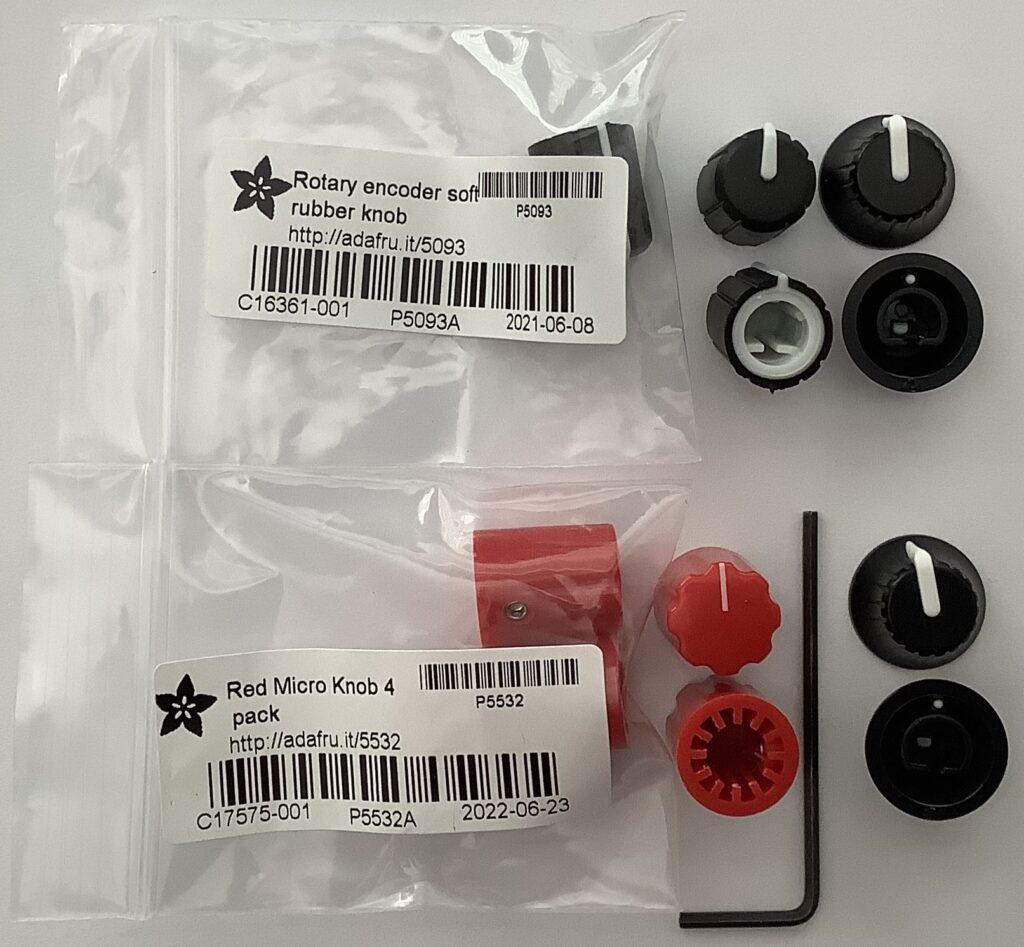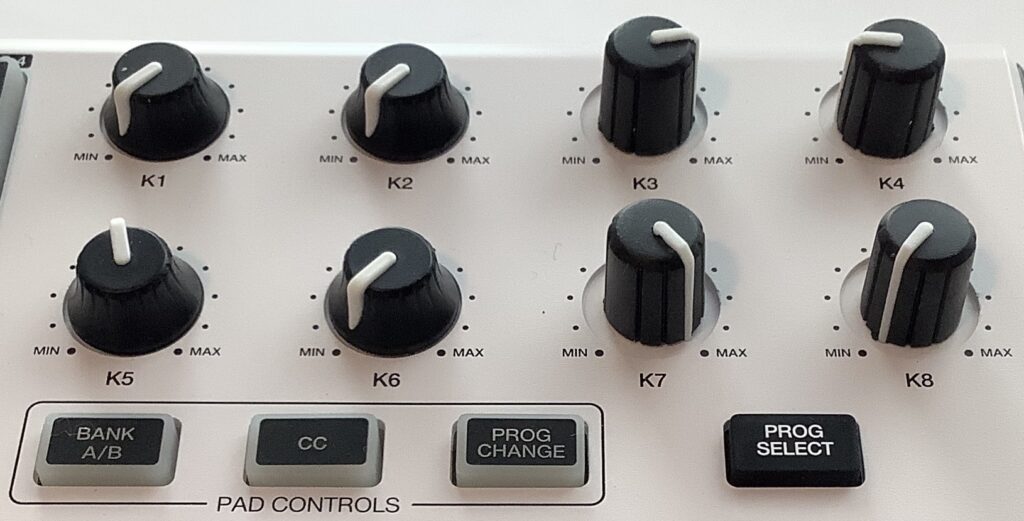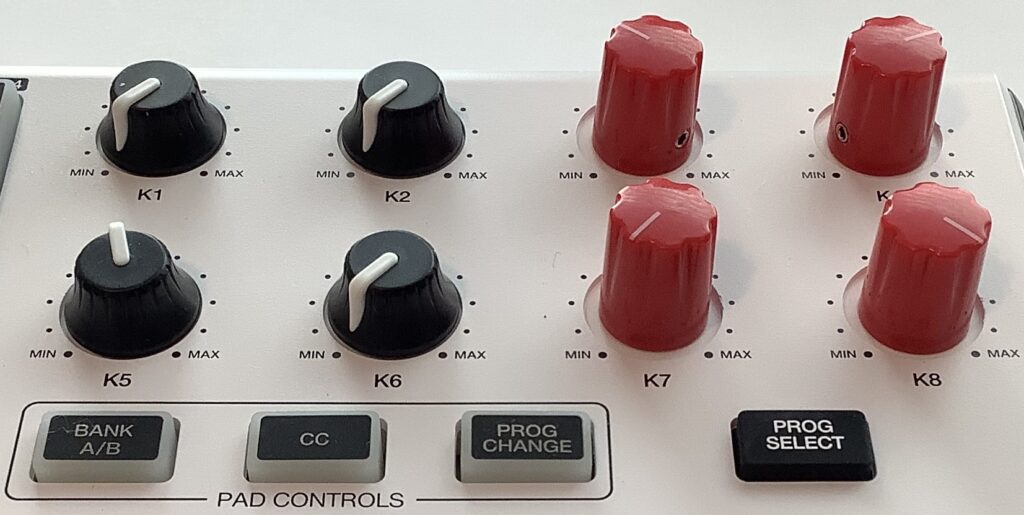Well, at first, I was going to strip it for parts. Then I changed my mind.
My original plan was to mod and customize an Akai MPK Mini Play (Mk1), making it a stand-alone synthesizer. As to cosmetics, I wanted to jazz it up with colorful knobs and a reverse white-on-black keybed. I would either find replacement keys or I would buy an Akai MPK Mini White Edition (Mk2), bust it down, and swap in the white-on-black keybed.
Hopes were dashed when I discovered the limitations of the MPK Mini Play’s implementation. Akai’s firmware blocks full access to the Dream S.A.S. SAM2635 synthesizer. I made a MIDI IN/OUT mod, letting me communicate with the Dream through 5-pin DIN MIDI. My original goal of a stand-alone synth, though, went down the tubes.
While the mod was playing out, I bought an Akai MPK Mini White Edition (Mk2) on ebay, ostensibly, for parts. BTW, if you’re looking for an MPK Mini, there are scads of them available on ebay for much less than retail. [If you’re OK with used.]
Gratefully, the previous owner had not registered the MPK Mini and I was able to download Akai’s software bundle. I installed MPC Beats — Akai’s MPC-style DAW — and the five expansion packs included in the bundle. I gave MPC Beats a try. Lo and behold, it was a lot of fun! I found the MPK Mini to be a better companion for MPC Beats than the MPK Mini Play. Suddenly, all desire to strip the White Edition was lost.
Now I want to keep using the MPK Mini (Mk2) as an MPC Beats controller and treat the MPK Mini Play as a MIDI module. Time to beautify the White Edition. [Spared from the chopping block.]
As to appearance and use, my one major quibble is the short, skirted knobs on both the MPK Mini and MPK Mini Play. I find these knobs hard to grab — more appropriate for small hands than my mitts.
Short knobs mean short pot shafts. Due to the short potentiometer shafts and the front panel recess around the pots, any old knob will not due. Casting around on the Web, I found two candidate knobs at Adafruit:
- Adafruit #5093 Slim rubber rotary encoder knob, 11.5mm by 14.5mm D-shaft
- Adafruit #5532 Red micro potentiometer knob (4 pack)
The red knobs are part of a multi-colored family. If red isn’t your fancy, try blue, black, white, cream, green, etc. Individually, both knob types are about $.70 USD per knob — not bad. Adafruit’s shipping is a tad high (one pound weight minimum charge) and you should look around for a few other things to buy in the same order. If you’re thinking about a 5-pin MIDI mod, I suggest the Adafruit MIDI FeatherWing Kit.
First up, is the Adafruit #5093. These knobs are only available in black. They are rubber and have a very nice feel. They only fit D-shaft potentiometers (or encoders) and are not appropriate for knurled or round shafts. The rubber knobs just barely cover the panel holes, but should keep out dust.
The pointers are well-placed and hit the min and max positions exactly. The rubber knobs are twice as tall as the factory knobs and are easy to grab. They are just snug enough on the pot shaft and can be removed without much force. I like these knobs and recommend them. Buy ten and get a price break.
I tried a few different Yamaha knobs on the MPK Minis. Forget it. The pointers don’t align with the min and max positions. Avoid knobs where the inner opening or set screw is too high above the bottom. Such knobs will float above the darned short Akai shafts.
Next up, is the Adafruit micro pot knob family. I bought red, black, blue, white and cream. The cream knobs look especially handsome. Unfortunately, cream clashes with the White Edition. Better to go with bright white (which match the sharp keys) or best to go full contrast and a splash of color, red.
The micro pot knobs have a very small set screw. Adafruit recommend a 2mm hex wrench, but the 1.5mm hex wrench in my Craftsman set is the better fit. This set screw is freaking small! Fortunately, the set screw is down low enough to hit the flat face of the rather short D-shaft.
The red knobs look great. The pointers align properly with min and max. The knobs are twice as tall as the factory knobs. The only down-side is the set screw. If you intend to open and close the MPK Mini case frequently, go with the rubber knobs. You will get tired for loosening and tightening the set screws on the micro pot knobs.
New knobs are a quick, inexpensive way to brighten up a front panel from dreary black. Tall knobs are easier to grab, too. There you have it.
Copyright © 2022 Paul J. Drongowski



